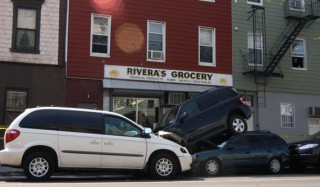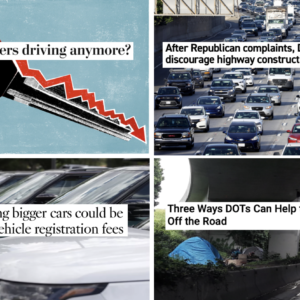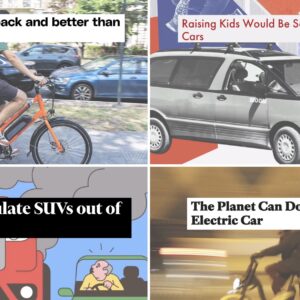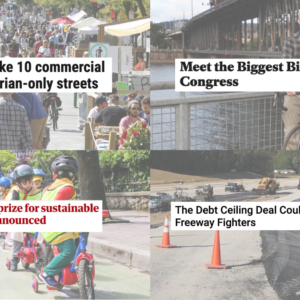
(Photo: Graham T. Beck via Streetsblog)
Here are the bike links from around the world that caught our eyes this week:
A for effort: New York’s top court found that a car thief who “fatally struck a Brooklyn pedestrian during a high-speed NYPD chase” isn’t guilty of murder because the fact that he sometimes swerved to avoid people as he sped down the street proves that he didn’t have a “depraved indifference to human life.”
Bike share buyout: Portland-based Alta Bicycle Share is on the brink of a deal to sell “at least 51 percent” of itself to a New York-based real estate company in exchange for a necessary cash infusion.
Car subscriptions: “In theory, flat-rate car plans can be cheaper, but in practice they just don’t work out in the long term,” writes a deliciously detailed guide from 2035 for choosing the right autonomous car subscription service.
More deaths: After seven years of decline, the number of annual U.S. vehicle fatalities ticked up in 2012.
Exporting good: Asked what one thing she’d like to bring from Portland to her new town, the woman who did her post-doctoral research at PSU and is now “bike czar” in Dallas, Texas said “open-mindedness.”
WNBR expansion: The city council in Missoula, Mont., has OK’d the city’s first World Naked Bike Ride for Aug. 17.
“Reform laws, not lawlessness”: It’s always fun to hear one’s own beliefs spoken in The Economist’s classic authoritative deadpan.
Bike trains: In Los Angeles, “free weekly rides led by proficient cyclists across the city” are spreading awareness of the “‘secret’ routes away from the main roads.”
Advertisement
Bike-shame rebuttal: A recent anonymous Guardian column claiming that bikers are the biggest threat to bikers is “nonsense on a stick,” according to a satisfying rebuttal.
Rumble strip errors: Delaware’s state DOT has been struggling to fix the rumble strips it illegally installed in the rideable pavement alongside a highway.
Civic investments: Strong Towns’ Chuck Marohn does some property tax math on a 1920s-style walking-oriented city block that his hometown wants to demolish and concludes that the “run down block that the city and others would like to see replaced is actually 41 percent more valuable than the brand new Taco John’s.”
Gas tax crunch: The near-bankrupcy of the federal transportation system isn’t being caused just by “partisanship and anti-tax extremism” but by the fact that elites have “lost touch with the rest of the country” by assuming that they need to keep building highways, argues transit activist Ben Ross.
Time competition: Even in U.S. cities with good public transit, driving is usually the fastest way to get around.
Just before San Francisco’s Lombard Street reopened to cars, locals showed up to celebrate the closure with a flash mob dancing to Pharrell’s “Happy.” It’s a shot in the arm and it’s your video of the week.
If you come across a noteworthy bicycle story, send it in via email, Tweet @bikeportland, or whatever else and we’ll consider adding it to next Monday’s roundup.







Thanks for reading.
BikePortland has served this community with independent community journalism since 2005. We rely on subscriptions from readers like you to survive. Your financial support is vital in keeping this valuable resource alive and well.
Please subscribe today to strengthen and expand our work.
The Strong Towns article is quite good, though I fear that reducing the argument strictly to the bottom line omits a few other points of comparison between the old storefronts and Taco Johns.
Not knowing the specifics of the situation, I’ll admit that these are guesses, but I think they’re reasonable ones.
First, while the owner of the Taco Johns franchise might be (and, knowing Brainerd, probably is) a local resident — the national franchise is much more likely than the comparison storefronts to be owned by someone from out of town. Plus, there’s only one Taco Johns owner, meaning that there’s more support for local initiatives and improvements from the multiple shopkeepers on old block than from the new one.
Second, each business probably represents a family wage for one or two people, plus some hourly work for others. The multiple storefronts on the old block provide a more solid foundation for the local economy than the pattern I’ve seen at fast-food restaurants: one owner who makes a good living, a manager who can scrape by, and a bunch of hourly workers who are probably students or folks trying to supplement the income of another low-paying job.
always great to see bike trains in the news!
“Bike share buyout: Portland-based Alta Bicycle Share is on the brink of a deal to sell “at least 51 percent” of itself to a New York-based real estate company in exchange for a necessary cash infusion.”
i’m glad that the tight relationship between the transport planning industry and real estate developers has come out of the closet. hopefully this will help active transport and sustainability advocates acknowledge that corporate planners are not always our friends.
Go on… explain.
money talks!
Hope you’re right; smells like a private equity takeover prior to disassembly and liquidation.
The stereotypes of NY based investment types don’t strike me as the type of people that would have any qualms simply firing everyone and selling off all the assets. Also: mosy of the anti-bicycle rhetoric in NYC comes from these 1%’ers.
Hope this turns out well but I’m not holding my breath.
Still banging the Idaho Stop drum, I see.
Meanwhile in Portland, I scared someone out of their pants trying to illustrate that they need to roll their car onto the weight sensor on Ladd.
I wonder if they ever got across Hawthorne. Sometimes it’s not even the law that’s broken.
They are induction loops, and you can trip them with a vine as well.
Bike. Not vine.
Some place needs to combine WNBR with a Polar Bear Plunge event.
If Missoula, MT did this in December or January they’d rock.
So, ride naked to a plunge into freezing water? I would hope they had full body blast dryers to prevent hypothermia after the “swim”.